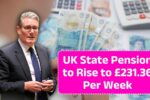With the rising cost of living, the government is offering financial support to help ease the pressure on households. The Department for Work and Pensions (DWP) has introduced a one-off £812 cost-of-living payment to help eligible individuals. If you’re wondering whether you qualify and how this payment works, keep reading. Let’s break it down in simple terms.
What Is the £812 Cost-of-Living Payment and Why It Matters?
The £812 cost-of-living payment is designed to help individuals and families struggling with rising living costs. It’s part of the government’s ongoing efforts to provide financial assistance during tough economic times. This payment is especially aimed at those who are already receiving certain benefits, such as Universal Credit, Pension Credit, or other low-income benefits.
For many people, this payment could provide some much-needed relief, covering things like increased energy bills, groceries, or transportation costs. If you qualify, this money could really make a difference, especially as the UK faces inflationary pressures.
Who Qualifies for the £812 Payment?
Not everyone will be eligible for this payment, so it’s important to check if you meet the criteria. Generally, to qualify for the £812 payment, you need to be:
- Receiving certain benefits such as Universal Credit, Pension Credit, Income Support, or Housing Benefit.
- Earning below a certain threshold or experiencing financial hardship.
Eligibility also depends on your circumstances, including whether you are employed or receiving government assistance. Typically, the payment will go to those who are most in need, so if you’re receiving benefits, there’s a good chance you’ll be eligible.
To make things easier, here’s a quick table showing the main benefits that make you eligible for the £812 payment:
| Benefit Type | Qualifying Amount |
|---|---|
| Universal Credit | Yes |
| Pension Credit | Yes |
| Income Support | Yes |
| Housing Benefit | Yes |
| Tax Credits (Child or Working) | Yes |
If you’re already receiving these benefits, keep an eye out for a letter from the DWP. The letter will confirm that you are eligible for the payment.
When Will the £812 Payment Be Made?
The £812 cost-of-living payment will be rolled out over a few months, with different payments made at different times depending on when you qualify. The first round of payments is expected to begin in October 2025 and will continue into 2026. If you’re eligible, you won’t need to apply for the payment — the DWP will automatically send it to you.
For most people, the payment will be made directly into your bank account, but if you receive benefits via a different method, it will be processed the same way. You should receive a notification letter from the DWP explaining when the payment will be made and how much you will get.
How Does the £812 Payment Work? Explained Simply
The payment is a one-off lump sum of £812, which will be paid directly to your bank account. You don’t need to apply for it separately — as long as you qualify and are receiving eligible benefits, it will be processed automatically.
The amount you receive depends on the benefits you’re already getting, and it will usually be paid alongside your normal benefit payments. The DWP will use the information they already have to assess your eligibility.
For example, if you receive Universal Credit or Pension Credit, you’ll typically see the £812 added to your regular payment schedule. If you’re not sure how or when you’ll get the payment, the DWP will send you a letter with all the details.
Common Mistakes with the £812 Payment and How to Avoid Them
Although the DWP tries to make the process straightforward, there are a few things that might trip people up. Here are some common mistakes to watch out for:
- Not updating your details: If you’ve moved house, changed your bank account, or had a change in circumstances, make sure the DWP has your correct information. Incorrect details can delay or stop the payment from reaching you.
- Assuming you don’t qualify: The eligibility rules can be a bit tricky. If you’re unsure, double-check the benefits you’re receiving. If you’re on the edge of eligibility, it’s worth contacting the DWP to confirm.
- Ignoring official letters: The DWP will send you a letter to let you know whether you’re eligible for the payment. Always read these carefully to make sure you’re not missing important information about when and how you’ll receive the money.
By staying on top of your details and being proactive, you can ensure that your £812 payment is processed smoothly.
Best Tips to Make the Most of the £812 Payment
The £812 payment is a helpful financial boost, but there are a few ways to make the most of it:
- Budget carefully: While £812 is a good sum, it’s important to manage it wisely. Use it for essential costs like bills, groceries, or transportation.
- Check for other support: If you’re eligible for this payment, you might also qualify for other government support, like discounts on energy bills or free school meals. Make sure you explore all the financial assistance options available to you.
- Save where you can: If you don’t need to use the full £812 immediately, consider putting some of it aside for a rainy day. Every bit of savings can help with future expenses.
The Latest Updates on the £812 Cost-of-Living Payment
The £812 cost-of-living payment is part of a broader government initiative to provide financial relief to low-income households. Although the payment is designed to help ease immediate financial stress, the government has hinted that more payments might be available depending on future economic conditions.
It’s also important to note that this payment is part of a wider package of support, so if you don’t qualify for the £812, you might still be eligible for other forms of assistance. Stay informed about any new developments from the DWP.
Conclusion: What You Need to Know About the £812 Payment
To wrap it up, the £812 cost-of-living payment is a valuable support measure from the DWP to help those in need. If you qualify based on your benefits, you’ll receive a one-off payment, likely deposited directly into your bank account. Make sure your contact and banking details are up-to-date to avoid any issues.
Keep an eye out for official communications from the DWP, and don’t hesitate to reach out if you’re unclear about your eligibility. By managing the payment wisely, you can ease some of the pressure of rising living costs.
FAQs
When will the £812 cost-of-living payment be made?
The first payments are expected to begin in October 2025 and will continue into 2026, depending on your eligibility.
What is the £812 payment for?
It’s a government payment designed to help individuals and families who are receiving benefits like Universal Credit or Pension Credit. The money is meant to ease financial pressure from rising living costs.
Why am I receiving the £812 payment?
You will receive the payment if you’re eligible for certain benefits. The DWP will automatically assess whether you qualify based on the information they already have about your benefits.
How do I know if I qualify for the £812 payment?
You qualify if you are receiving certain benefits, such as Universal Credit, Pension Credit, or Income Support. The DWP will send you a letter confirming your eligibility.
Can I apply for the £812 payment?
No, you don’t need to apply for this payment. If you qualify, the DWP will automatically send it to you, usually alongside your regular benefit payments.



